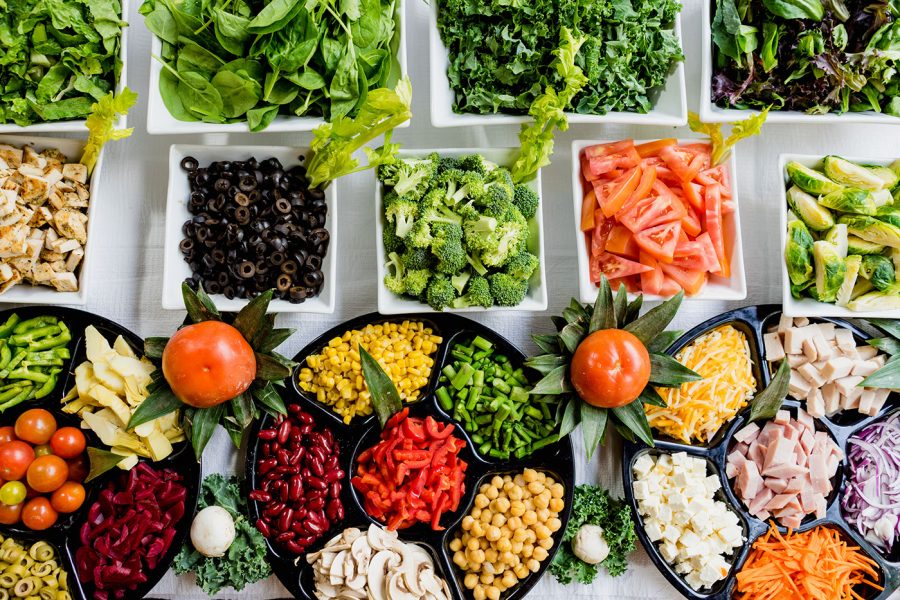Column: Popular diet trends are not the way to lose weight
“Healthy Food Photography” by Dr. Jenson Mak is licensed under CC BY-NC-ND 4.0
Trending diets often fail to bring sustainable, long-term weight loss.
October 22, 2019
We all know one of those people who went on a crazy diet and lost what seems like half their body weight, and if you’re anything like me, you have been jealous of them but don’t have the willpower to follow in their footsteps. Or maybe you went a step further than I did and tried the same diet as your friend but didn’t find the same success.
The reason why most diets don’t work is simple: People just can’t stick to them.
Some of the most popular diets are the Whole30, Keto, Paleo and CICO.
These kinds of diets are not sustainable. The Whole30, for example, is named after the fact that it only lasts 30 days. But after that month, the dieter is left saying, “Now what?”
The truth is, although there aren’t exact numbers to prove this, it is estimated that anywhere between 80 and 95 percent of people who are successful with their weight loss after their diet eventually gain it back.
There are an overwhelming number of diets out there for people to choose from, with new diets constantly surfacing. Cookbooks, documentaries and guides are becoming more and more popular, contributing to a $72 billion weight loss industry. This number is only expected to increase, as “the total market is forecasted to grow 2.6% annually through 2023.”
The Whole30 diet consists of not eating sugar for 30 days, cutting out cravings and starting to eliminate sugar addiction.
There is also the popular ketogenic (keto) diet, also known as “low carbing,” which is a diet where you consume little to no carbohydrates. When you lower your amount of carbohydrate intake, it “forces the body into a state of ketosis” — the body starts to burn fat to generate energy instead of the typical burning of carbohydrates.
The Paleo diet is a diet that supposedly mimics a diet that may have been eaten in the Paleolithic Era. According to the Mayo Clinic, “[a] paleo diet typically includes lean meats, fish, fruits, vegetables, nuts and seeds — foods that in the past could be obtained by hunting and gathering.” This diet is often criticised, as there is evidence that humans of the Paleolithic Era ate grains, and the modern day paleo diet calls for no grains.
Another diet rising in popularity is CICO, an acronym for “calories in, calories out.” This is a diet where you track all the calories you eat and all of the calories you burn. The goal of CICO is to burn more calories than you consume. This diet requires heavy involvement, as you have to measure the exact amount of calories you are eating and the precise amount of calories you burn. The deficit in the amount of calories you consume should, theoretically, correspond to the amount of weight you lose.
Common and potentially problematic sources of information for people seeking health advice are documentaries and dieting guidebooks. The documentary “What the Health,” for example, claims that “eating one egg is equivalent to smoking five cigarettes.” This statement shocked me, as I am someone who eats about 18 eggs a week — I love eggs.
The basis behind this claim is that egg yolks are particularly fat-filled, while protein actually comes from the egg white. People who smoke five cigarettes a day have higher cholesterol, and the high amount of fat in egg yolks will apparently lead to the same result.
However, just because you eat an egg a day doesn’t automatically make your health equivalent to that of a heavy smoker. The study that led some nutritionists to this conclusion was done on a group of individuals who were already sick and at risk for high cholesterol.
Maria Luz Fernandez, a professor at the University of Connecticut in the Department of Nutritional Sciences, has used her expertise in the field to help skeptics question this bold assertion. “Eggs should not be eliminated from the diet because they not only provide a substantial amount of nutrients, but they also have health benefits that go beyond nutrition,” Fernandez said in an interview with Best Food Facts.
Other claims in this film should be taken with a grain of salt as well. Sure, some studies say red meat is bad for you, and it has been proven that eating a vegetarian or vegan diet has numerous environmental benefits. But not all of the assertions made in the documentary can be taken as fact, and these statements can be confusing to Americans trying to navigate their way through the multibillion-dollar weight loss industry.
Should dieters commit to a drastic lifestyle change by going vegan? Should they do something short-term and try the Whole30? Is there any diet that falls somewhere in between?
In the end, a truly sustainable diet is about finding an eating pattern that works for you.
The secret to actually losing weight is not found in a diet like Keto, Paleo, the Whole30, CICO or veganism. It does not matter what diet you decide to do, or if you decide to go on a diet at all. Instead, the key is balancing your activity level with the amount of calories you consume. Find a diet you can stick to so it does not feel like a diet anymore — just the way you live.







